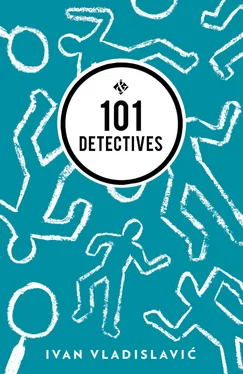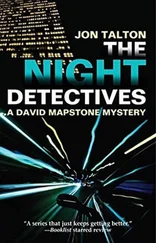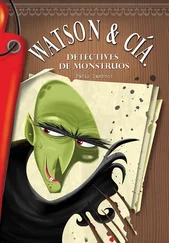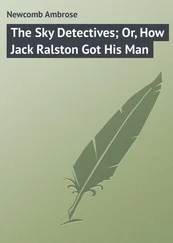Ivan Vladislavic - 101 Detectives
Здесь есть возможность читать онлайн «Ivan Vladislavic - 101 Detectives» весь текст электронной книги совершенно бесплатно (целиком полную версию без сокращений). В некоторых случаях можно слушать аудио, скачать через торрент в формате fb2 и присутствует краткое содержание. Год выпуска: 2015, Издательство: And Other Stories Publishing, Жанр: Современная проза, на английском языке. Описание произведения, (предисловие) а так же отзывы посетителей доступны на портале библиотеки ЛибКат.
- Название:101 Detectives
- Автор:
- Издательство:And Other Stories Publishing
- Жанр:
- Год:2015
- ISBN:нет данных
- Рейтинг книги:4 / 5. Голосов: 1
-
Избранное:Добавить в избранное
- Отзывы:
-
Ваша оценка:
- 80
- 1
- 2
- 3
- 4
- 5
101 Detectives: краткое содержание, описание и аннотация
Предлагаем к чтению аннотацию, описание, краткое содержание или предисловие (зависит от того, что написал сам автор книги «101 Detectives»). Если вы не нашли необходимую информацию о книге — напишите в комментариях, мы постараемся отыскать её.
and
, invites readers to do some detective work of their own. Each story can be read as a story, but many hide clues and patterns. Whether skewering extreme marketing techniques or constructing dystopian parallel universes, Vladislavic will make you look beyond appearances.
101 Detectives — читать онлайн бесплатно полную книгу (весь текст) целиком
Ниже представлен текст книги, разбитый по страницам. Система сохранения места последней прочитанной страницы, позволяет с удобством читать онлайн бесплатно книгу «101 Detectives», без необходимости каждый раз заново искать на чём Вы остановились. Поставьте закладку, и сможете в любой момент перейти на страницу, на которой закончили чтение.
Интервал:
Закладка:
How much could he be made to bear though? Among the books that were in a category of their own, the one that bothered me most was Juden sehen Dich an by Johann von Leers, an anti-Semitic diatribe by one of Hitler’s most poisonous propagandists. Of course, the possession of such an odious book did not necessarily mean that Claude — or Berti — had been a Nazi or an anti-Semite, but the sight of it filled me with disquiet.
I created a folder called Dr T (still wishing to preserve a formal distance between myself and Claude, my subject, if that’s what he was) and stored my list in it. Digital records are a marvellous advance on the paper ones in this respect: they gather no dust and they occupy so little space.
The following winter, a pipe burst in the roof of the guest suite and ruined the ceiling and walls. In order to repair and repaint the place, the trunks had to be moved. Fortunately, none of the contents had been damaged. Extracting the valuables a couple of years earlier had created space in all four trunks and this seemed like the right time to repack them more sensibly to lighten my load. I had shuffled through the papers too often still to have qualms about disturbing their arrangement. Finally relinquishing whatever correspondences the physical ordering of the papers may have revealed, I repacked everything and left one of the metal trunks empty. Rusted though it was, the painter was very pleased to have it. When the job was done, he filled it with tins and brushes and took it away on the back of his bakkie.
Then I forgot about the trunks. Margery and I had drifted apart and I no longer expected her to call to find out if I had made up my mind about Claude and Berti. The trunks simply sat there in the guest suite; they had become part of the furniture.
In May of 2008, a thief broke into the guest suite and made off with some linen, a two-plate stove and a handful of ornaments. He ransacked the trunks, throwing books, letters and photographs out on the floor and the bed, but found nothing. This intrusive stranger brought the trunks back into focus for me. I was glad now that I’d thought to move the valuables into the house. Worthless as many of these objects were, a frustrated housebreaker may well have walked off with them. But such a thief was always unlikely to steal papers. As far as I could see, not a single item was missing. But how on earth would I know? One thing was certain: whatever residual logic the ordering of the papers may have retained was now inalterably undone.
I repacked the papers and had the shattered door repaired. I thought about putting in a security gate or an alarm, but the truth is there was not much left to steal out there. My house guests had stopped coming too. The friends who used to call on me felt unsafe in my neighbourhood; they knew people in the northern suburbs who offered them safer, more comfortable lodgings.
After the burglary, I went out to the guest suite more often to check that everything was in order. A few months later, when I opened the door, I noticed a single cufflink lying on the tiles, a silver disk with an ivory cameo inset, perhaps depicting a Roman god. It must have been dropped by the thief, I thought, as he made off with the other one in the pair. But where had he found them? I’d never seen them before. I’d meant to move everything of value from the trunks, but perhaps I’d missed something, some small cache of treasures, a cough-drop tin full of coins, a cigar box holding an old timepiece or an antique razor. More importantly, why had this object, this shiny clue lying in the middle of the floor, remained invisible until now? It seemed impossible that I could have overlooked it. Who or what had carried it out into the open? I checked the windows, but there was no sign of forced entry, as the detectives say. I peered through the keyhole, as if that would tell me something.
In that moment, I wished that the thief had carted away the trunks and left me nothing but this mismatched cufflink. At the same time, the fear of never seeing their contents again ran through me like a paperknife.
So I arrived, by the circuitous and painful route described here, at a point of equilibrium. I had been in possession of Dr T’s trunks for more than a decade. I no longer believed I could make anything of them, nor could I imagine getting rid of them. I was simply stuck with them.
It’s not true to say I could make nothing of them. Without even trying, I already had. From time to time, when I least expected it, some scrap of the life story of Claude and Berti would drift into my mind, almost like a distant memory of my own childhood. Berti worked as a manufacturers’ representative for textile factories in Manchester and he spent half his life travelling. He was always on a boat to Singapore, Calcutta, Yokohama, Colombo, Hong Kong. Among his papers were scores of sample catalogues and price lists, manuals for power looms, tables of weights and measures. His little notebooks were filled with the names of clients, quotations, orders. Wherever he went, he took photographs of himself with the men he met in the course of business, and sometimes with their wives and children, almost as if they were his own. He sent postcards from a hundred different cities, not a few of them now vanished from the atlases — Leopoldville, Lourenço Marques, Port Swettenham, Saigon — always missing Claude, always wishing he were there. The postcards let me imagine Claude too, running downstairs in the mornings in his pyjamas, with a legionnaire’s helmet on his head and a six-shooter strapped to his hip, hoping to see a card from Berti lying on the carpet under the slot in the front door. Claude’s mother, Berti’s wife, must be there too, but I could not picture her at all.
In the autumn of 2011, circumstances compelled me to put my house on the market. The trunks could not be moved again: I would be going to a flat where there simply wasn’t space for such bulky things. Even if I kept the papers, as I thought I might, the trunks themselves would have to go, along with the other excess furniture. I had to tidy the place up before the show days began.
The first step was to distribute the contents of the trunks into smaller boxes. I went down to Box It at the Darras Centre and acquired twenty C14 boxes, which the man behind the counter assured me were just right for books. He taught me a valuable lesson about assembling a cardboard box: never fold the flaps over one another (as I had always done). The strength of the box lies in the corrugations that keep them rigid and bending the flaps to interlock them weakens the whole structure. Instead, simply fold the short flaps towards one another, then do the same with the long ones, and run a length of packaging tape along the seam. It looks like a flimsy join, but it’s ten times stronger than a folded one.
I did not have time to linger over the books and papers in the guest suite. As quickly as I could, I would almost say frantically, I assembled boxes, filled them and sealed them. On some of them I wrote ‘Dr T’ and on others ‘Claude’. After all these years, the man was out of the coffin and multiplying.
When I was done, there were around a dozen full boxes. Emptied of their weighty contents, the trunks seemed smaller and I had second thoughts about shedding them. All of them were in poor condition, but the metal one would be easy to fix: knock out a few dents, strip off the paint and refinish it, and you would have a perfectly good trommel. The wooden chest could be sanded down and revarnished, and furnished with new hinges and handles. The steamer chest with the hardwood slats was a different matter. Some film-properties company or design studio would love to get their hands on it. It was very Out of Africa . I could see it rented out to an advertising agency; or doing duty as a coffee table in the right sort of baronial Bryanston townhouse. You’d want to restore it first, clean it up a bit without making it look good as new, as if it had just been carried off a Union-Castle liner from Southampton.
Читать дальшеИнтервал:
Закладка:
Похожие книги на «101 Detectives»
Представляем Вашему вниманию похожие книги на «101 Detectives» списком для выбора. Мы отобрали схожую по названию и смыслу литературу в надежде предоставить читателям больше вариантов отыскать новые, интересные, ещё непрочитанные произведения.
Обсуждение, отзывы о книге «101 Detectives» и просто собственные мнения читателей. Оставьте ваши комментарии, напишите, что Вы думаете о произведении, его смысле или главных героях. Укажите что конкретно понравилось, а что нет, и почему Вы так считаете.












